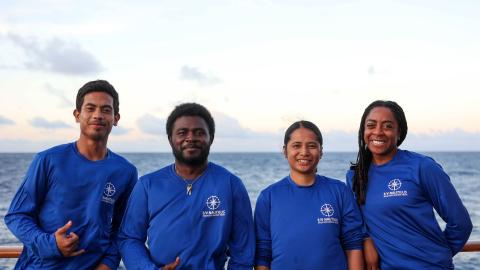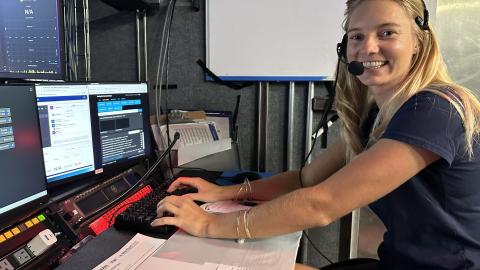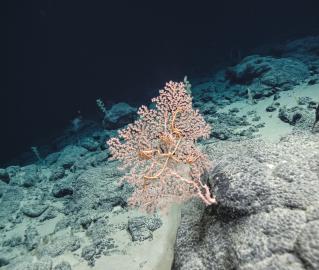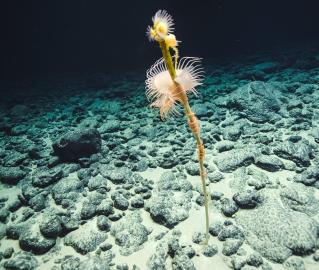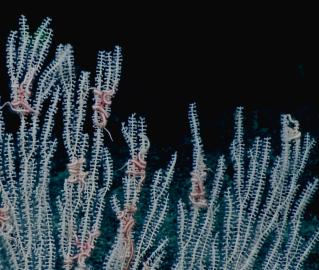
Brittany Munson
Tell us about your work/research. What kinds of things do you do?
I work at the California Science Center, a free museum in the heart of Los Angeles, California. As Senior Educator, I get to share science with people of all ages. In my role, I wear a lot of different hats - from teaching biology to high school girls, to Virtual Field Trips for K-5 students, to working on the floor of the Science Center to training our teenage interns, and much more! One of my favorite projects has been writing the curriculum and creating activities for the Blue Whales IMAX film premiering at the California Science Center this spring. I work on a variety of different things, and there is never a dull moment!
What sparked your initial interest in your career?
The movie Free Willy! I must have been about 4 or 5 years old when I saw it for the first time, and I remember watching the VHS tape multiple times a day. When I discovered that killer whales were not the only amazing thing in the sea, I became hooked wanting to learn more about what lived in the ocean. I began volunteering at a local aquarium in my teenage years and have been heavily involved in anything ocean/science/conservation-related ever since.
Who influenced you or encouraged you the most?
There have been many people who helped me get to where I am today. I had many mentors who introduced me to new opportunities and gave me the support I needed to go after them! I especially appreciate those who supported me in finding ways to look at how to teach/learn science in ways that are creative and outside the box, and to not take myself too seriously. There are so many who have guided and encouraged me; Shannon Penna, Evelyn Serrano, and Kristal Ambrose are just a few mentors who especially had a positive impact on my journey.
What element of your work/study do you think is the most fascinating?
I love how the Science Center promotes learner-first approaches to education. All of our methods focus on asking questions more than answering them, and letting our guests and students lead the investigation. Also, anytime I can go whale watching and call it work is my absolute favorite.
What other jobs led you to your current career?
I really value having experiences of learning, exploration, conservation, and adventure and sharing those moments with others. I have spent time being a Marine Mammal photo I.D. intern, focusing on collecting data about blue whales in order to aid in implementing protective measures in their feeding areas. I was a Coral Reef Ecology and Restoration intern in the Bahamas; I worked on helping to survey the health of reefs, growing and out-planting healthy coral. I was an onboard naturalist on vessels in Alaska, telling visitors about the geology, flora, and fauna they were seeing on tour. I was a Guest Lecturer aboard an expedition ship in Alaska, and I volunteer with a local whale watching company here in Southern California. At the Science Center, I don't "get out" as much, but I still love bringing all of these experiences to the table as I engage members of the local community in exploring various scientific topics.
What are your degrees and certifications?
Bachelor of Science in Aquatic Biology--University of California, Santa Barbara 2015; PADI Advanced Open Water SCUBA Diver
What are your hobbies?
I love to go whale watching! I also have a keen interest in wildlife and nature photography. Traveling is a passion of mine and I aim to (responsibly and sustainably) explore and experience as much of this planet as I can while I am able to do so!
What advice would you give someone who wants to have a career like yours?
I would encourage everyone to pursue gaining a variety of experiences rather than focusing solely on classes! So much of what I have learned in my career comes from having experiences in the field and learning on the job, not in a classroom. All of my different volunteer positions, internships, and jobs were invaluable. I also found A LOT of opportunities through networking, and just reaching out to people I thought were doing interesting work. Lastly, make sure you have a genuine interest in what you’re doing because that will make your work even more fulfilling.
How did you get involved with the Ocean Exploration Trust?
I saw that someone made a post highlighting the fellowship position in one of the marine biology groups I am a part of on Facebook. I recalled seeing someone I follow on Instagram sharing her experience as a Science Communication Fellow. It looked like such an amazing experience, and I thought it would be a great opportunity to try it for myself!
Expeditions
Brittany participated in the following Ocean Exploration Trust expeditions:
